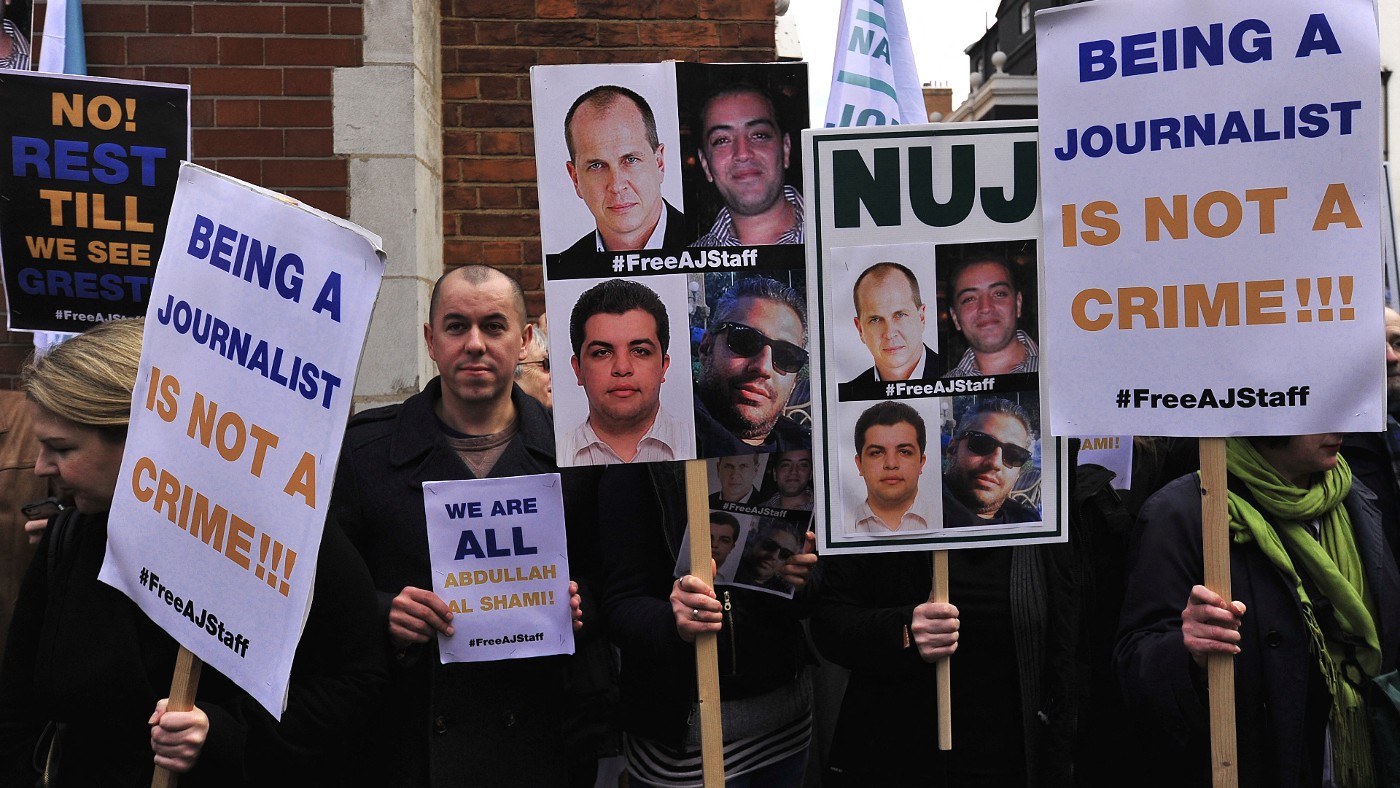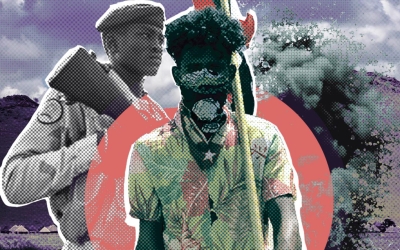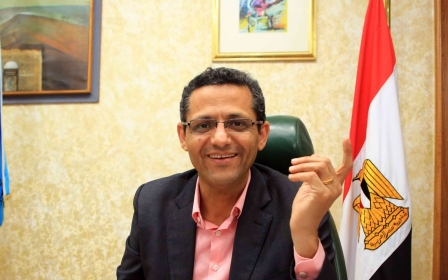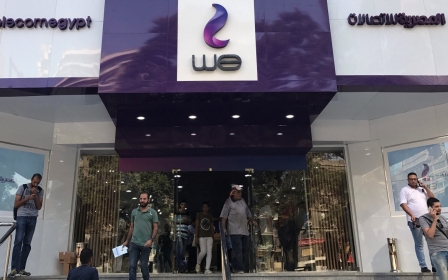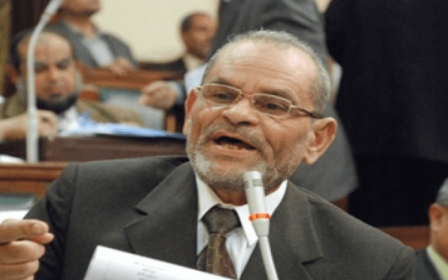Egypt: Exiles denied passports as the government seeks to bring them home

Egyptian dissidents abroad have told Middle East Eye they are being denied the right to renew their passports and identity documents as a means of pressuring them to return home to Egypt.
In 2017, the well-known Egyptian journalist Hosam Yahia, then based in Qatar, tried to renew his passport a year before it expired. The Egyptian embassy in Doha gave him a one-year renewal instead of the standard seven years, which surprised him.
When Yahia asked for a reason, embassy staff said he was due for conscription, despite having submitted the necessary documents proving his exemption. They promised him that the next time he renewed his passport, it would be for seven years.
In the following months, a local Egyptian media campaign was launched against the Qatari state-backed Al Jazeera channel and Egyptians who work there, including Yahia.
Relations between Egypt and Qatar had deteriorated after the Egyptian military overthrew the Muslim Brotherhood-backed government of President Mohamed Morsi in 2013.
New MEE newsletter: Jerusalem Dispatch
Sign up to get the latest insights and analysis on Israel-Palestine, alongside Turkey Unpacked and other MEE newsletters
The coup was supported by Saudi Arabia and the UAE, while Qatar condemned it. Al Jazeera, which had unsettled Qatar's neighbours, including Egypt, with its favourable coverage of the Arab Spring protests, had its local Egyptian affiliate closed down shortly after Abdel Fattah el-Sisi took power in Cairo.
Meanwhile, security forces had raided Yahia's family home in Egypt and his address in Doha was published on social media, a move he calls a “political reprisal”.
When the Al Jazeera presenter attempted to renew his one-year passport, embassy staff asked him to return to Egypt or to visit the military attache in Abu Dhabi. Yahia was concerned about travelling to the UAE, which had previously deported Egyptian dissidents. The embassy insisted.
Yahia left Egypt in 2014 and hasn't seen his family since. With his Al Jazeera colleagues Rabie al-Sheikh, Hisham Abdelaziz and Bahauddin Ibrahim all currently languishing in Egyptian prisons, he knows how dangerous returning could be.
Yahia cannot renew his residence permit or work in Qatar without a valid passport. So, he used the only remaining option. “In June 2019, I applied for asylum in the UK. I felt that I was going to the unknown without any will from me,” Yahia told MEE.
The journalist had to wait for nearly two years to be granted the right to remain in the UK. Living - or waiting to live - in a western country left Yahia feeling uprooted from his home, identity and culture.
From Cairo to Khartoum
Ali (not his real name) faced a similar ordeal at the Egyptian embassy in Sudan in late 2019.
He had been living in Sudan for a long time, visiting Egypt every few months. But that changed, and by 2019 his last visit had been in 2013, when his only brother was killed in the Rabaa massacre, during which Egyptian security forces under Sisi's command killed at least 1,000 protesters.
This was a reason for Ali's exemption from military service and besides, he had exceeded the legal age for the military.
He visited the embassy's military attache in Khartoum to figure out another solution. The officer ordered Ali to go back to Egypt and settle a “military reconciliation” by paying a fine.
Ali feared being arrested by Egyptian state security, being imprisoned or disappeared, as had happened to people he knew. His home had recently been raided, with security officers asking about his murdered brother.
Ali's passport expired while he was trying to resolve the issue with Egyptian authorities in Sudan. He extended it by paying individuals who claimed to work with a diplomatic mission, but they warned him not to travel to any Arab countries. Human Rights Watch (HRW) has reported cases of security officials of countries interrogating travellers with such extended passports.
After the October 2021 military coup in Sudan, Ali used the extension and went to Turkey that December. He obtained a residence permit, but it and the extension will expire by the end of this year.
HRW says Turkey has granted many Egyptians residence permits on humanitarian grounds for their exceptional circumstances fleeing oppression, but Ali doesn't know if he qualifies. He applied for his family, who joined him later, but they've been waiting for a response for eight months.
While he is thankful to Turkey for helping Egyptian oppositionists, he is worried that recent improvements in relations between Turkey and Egypt could change the situation. In April 2022, an opposition Egyptian television channel that had been based in Turkey shut its offices.
Ali now intends to take the perilous trip to Europe by boat. When asked how he feels, Ali remained silent for a few seconds before responding: “I have felt like an animal.” He also said that he felt as if he were trapped in a large prison with no consideration for his future.
In Sudan, his Egyptian background meant that he had faced obstacles in using his background in economics and political science to pursue a career. In Turkey, he struggled for two years to find a job. The lack of valid documents meant that his family found it very hard to obtain official documentation for his daughter.
Likewise, MEE interviewed Ibrahim Abouali, an Egyptian activist and political science graduate in Malaysia, who previously threatened to end his life on Facebook Live after being unable to renew his passport.
Abouali applied for asylum with the UN's refugee agency, the UNHCR, in 2020. He received no response for about two years until his live video prompted a slew of media coverage and human rights pressure.
During this time, he experienced stress, anxiety, and even received a message urging him to leave Malaysia as he was residing there illegally.
Abouali received a document protecting him from deportation after an interview with UNHCR last December, but it only lasts for a year and doesn’t permit him to work in Malaysia.
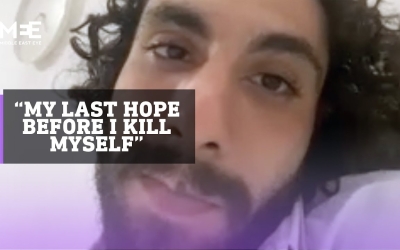
During the interview, he was asked about his suicide attempts, among other questions. Abouali must undergo another interview to gain refugee status, but the timeline is unclear. His invalid passport affected his health; he discovered he had diabetes during alcohol addiction treatment but he cannot obtain health insurance for regular hospital visits.
To escape their situation, some Egyptians have crossed borders illegally or purchased a Syrian passport. MEE contacted three individuals but they declined to speak, while a fourth was reserved and shared few details.
“I don't have much to say. I was expelled from Al-Azhar University in Cairo, arrested for a while, and received a military sentence. As a result, I couldn't obtain a passport, so I was smuggled into Sudan on a dangerous journey,” he told MEE.
He mentioned that after the Sudanese coup in October 2021, the embassy requested the authorities to ask some Egyptians to leave, so he used a Syrian identity.
Using his new identity, he entered another country but was arrested several times and faced the possibility of being deported to Syria. He can’t move freely around this country or travel anywhere else and, to this day, he has been unable to obtain an Egyptian passport.
Middle East Eye delivers independent and unrivalled coverage and analysis of the Middle East, North Africa and beyond. To learn more about republishing this content and the associated fees, please fill out this form. More about MEE can be found here.


